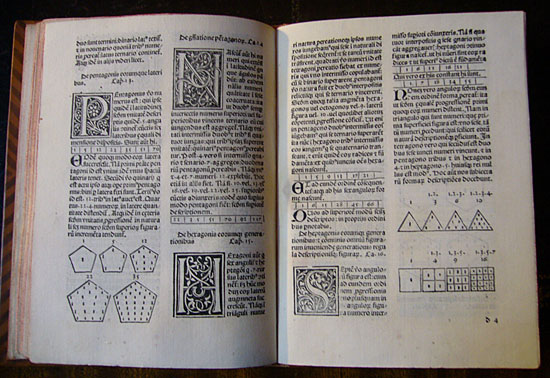Highlights

BOETHIUS, Anicius Manlius Severinus (480–524 or 525)
Incipiunt duo libri de Arithmetica
Venice:1488.
 B
B
oethius was a Christian philosopher of the 6th century. He was born in Rome to an ancient and important family which included emperors Petronius Maximus and Olybrius and many consuls. His father, Flavius Manlius Boethius, was consul in 487 after Odoacer deposed the last Western Roman Emperor. Boethius himself was consul in 510 in the kingdom of the Ostrogoths. In 522 he saw his two sons become consuls. Boethius was executed by King Theodoric the Great, who suspected him of conspiring with the Byzantine Empire.
Printed the same year as his De institutione arithmetica Augsburg 1488 this is the basic mathematical textbook of the Middle Ages. Boethius conceived it as one of four treatises, each devoted to a branch of the “quadrivium” a term coined by Boethius and first used in this work, comprising arithmetic, music, geometry and astronomy. Together with the trivium (grammar, rhetoric, dialectic), they form the seven liberal arts. Of Boethius's treatises on the quadrivium only his works on arithmetic and music survive.
One of Boethius's aims in writing his works on the quadrivium was to make available to the Latin world the great works of Greek learning. Incipiunt duo libri de Arithmetica is in essence an expanded translation of the work of the Alexandrine Nicomachus of Gerasa, who's Arithmetics was as celebrated as Euclid's Geometry in Greeco-Roman times. The book treats the properties of numbers explaining arithmetical theory and sets forth practical applications. It is imbued with the neo-Pythagorean theory of number as the divine essence of the world and embraced in the Renaissance for its view of unity as the constitutive element of plurality.

